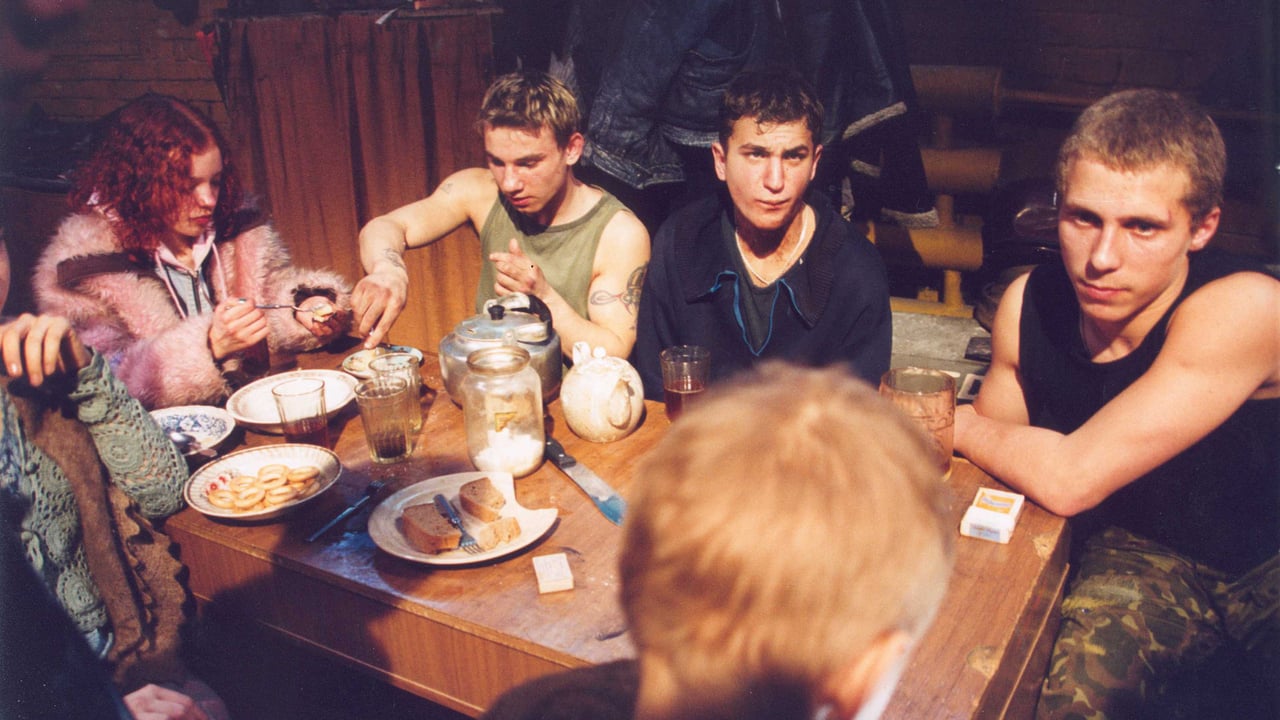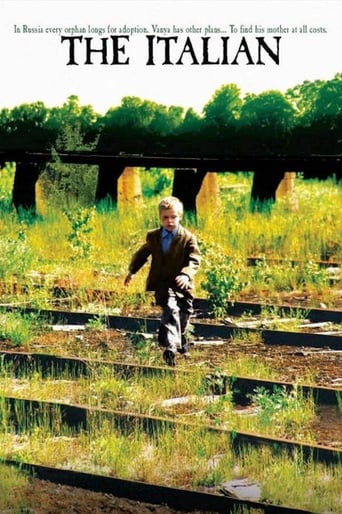

You seldom see as many good acting jobs in one movie.For me the highlight was the little blonde girl being photographed holding the stuffed animal."I told you not to blink," the fur-coated lady who intended to sell her hissed.Among the appealing characters were those who appeared only briefly but helped the little boy, including the man who walked him to the bus, the man who ran the second orphanage, the workers he played cards with on the train, the lady smoking between train cars who helped him, the skinny red-haired girl who got him started on his trip, etc.
... View MoreAn earlier posting compared this film with Spielberg's "AI", a robotic boy with artificial intelligence with the capacity to form emotional bonds, a sort of interesting point, as this film itself aims a bit lower than the intelligentsia level, more at gut level emotions, since its main character is a young boy in a rundown Russian orphanage who spurns the rich Italian couple who wants to adopt him in favor of going on a treacherous journey to find his mother. And to throw a few more logs on the flames of passion, the orphanage's director collects a nice sum for adoptions of poor Russian youth by wealthy foreigners, and hence sets out with her part-time lover and assistant to trail and apprehend the kid with the help of the police, whom she pays off, as he searches for his mom. It doesn't fail to be moving, but in the department of originality, it utilizes a lot of the usual devices as it goes through its well-presented drama.
... View MoreA sadder state of affairs would be hard to imagine: the little "Italian," so flawlessly played by Kolya Spiridonov (which, ironically, sounds not unlike "spirit enough" in English), is beaten by an older, Artful Dodger-type when it's discovered that he wants to learn to read. His reason for wanting to learn to read is even sadder: he wants to find out who his real mother is, and where she lives (if she still does). He sits perched in a window, watching and waiting for her to return. Rumors abound among the children of the orphanage: kids are being adopted so that they can be "sold for spare parts." This "real Russia" is nothing if not frigid... at first glance. Upon closer examination, however, we find a deep and abiding warmth. The young girl who serves as "den mother" to the younger kids comes to "the Italian" after he has been beaten and hugs him wordlessly in what just may be one of the greatest, most beautiful moments in movie history. I highly recommend THE Italian.
... View MoreThe Italian/Italianetz is a good use of neorealistic effects almost worthy of Zavattini and De Sica to tell the story of a Russian orphan at the present time, a boy of six who's set up for adoption by an Italian couple and then determines to sneak off and see if he can find his own mother instead. Arranging adoptions on a freelance basis, apparently, outside the chaotic social system of present-day Russia, is a lady they call Madam (Mariya Koznetsova), plump, bossy, slick, followed around by a glum factotum, Grisha (Nikolai Reutov), who's her chauffeur, toady, and sometime lover. She makes a bundle out of each successful adoption by foreigners and makes free with bribes and threats to be sure her deals go through. A product of modern Russian capitalism, the money-mad Madam is more villain than fairy godmother.Using a photo followed up by an on-site interview at the detsky dom (children's home), Madam has arranged with an Italian couple, Roberto and Claudia, to adopt young Vanya Sonetsiv (Kolya Spridonov). But then when Vanya meets up with a remorseful drunken mom who apparently commits suicide after learning her child has been adopted and taken to Ialy, he gets the urge to investigate his own record. Everybody acts like he's such a lucky guy. But supposing he goes off with Roberto and Claudia? Mightn't he miss out on a chance to be reunited with his own mother, should she have a change of heart and want him back? Is there such a chance, though? And where is his mother? To find out, first Vanya has to learn to read a detail the orphanage has neglected and find a way to get a look at his file.The detsky dom's administration is not exactly on the up-and-up. The wild looking director (Yuri Itskov) is drinking up all the funds, and to fill in the vacuum this leaves a small clique of older boys to pretty much run the place and its finances, like a rawly capitalistic petty mafia, sporting scars, tattoos and muscles and throwing around words like "cosa nostra." Led by a boy named Kolyan (Denis Moiseenko), they have their own little systems of businesses and payoffs. And this shadow regime, up to a point anyway, really seems to work. The kids' beds are clean, and the girls mend their clothes and read them fairy tales at bedtime. But it's clear there's no pathway to a better future in the life here. Vanya, whom everybody now calls "the Italian" because of the good fortune they feel he's destined for when the papers go through in a month or so, now wangles his way in with the older boys, and they help him out. Among these undergrown mafiosi is a girl named Irka (Olga Shuvalova) who they pimp out to truck drivers. It's she who teaches Vanya to read. The big boys help Vanya break into the room where the records are kept and he gets the address of the maternal home where he came from, and Irka takes Vanya to the railway station, having robbed the boys' current till and intending to run off with him. Madam immediately finds out that Vanya has disappeared and, standing to lose her payoff if she can't deliver him to the Italian couple, she sets off in hot pursuit with Grisha.What follows is a wild chase in which Vanya shows what he's made of. Nothing, and that includes some pretty rough scrapes, can stop him from his relentless flight and quest. The Italian never loses its authentic flavor either as it moves toward an emotionally satisfying if somewhat hasty finish Still, it's obviously in the first half of the film that we get our best look at this world and its people and the Russian orphan problem. It might even have been a better treatment of that issue if some of the earlier scenes had been allowed to play out a bit longer.The San Francisco Chronicle's venerable Ruthe Stein called this the best "naturalistic performance by a Russian child actor since Kolya a decade ago." Spiridonov is very effective and appealing in his role, and perhaps The Italian has some links with that somewhat saccharine earlier film. But The Italian is more chastening than Kolya. A more appropriate recent comparison (and another great youth performance in Russian) is the picaresque, unpredictable Schizo (2004), directed by Guldchat Omarova with the 15-year-old Oldzhas Nusupbayev. The Italian isn't saccharine, but it's also not as grim a view of the plight of lost Russian children as Lukas Moodysson's deeply depressing 2002 film Lilja 4-Ever. See all four and decide for yourself which feels like the most convincing and cinematic story of Russian childhood. You'll have to consider whether Kravchuk undercuts or strengthens his material by turning it into a fairy tale. It was the urge to depict a growing social problem and at the same time tell an engaging story that must have drown a documentarian like Kravchuk to this subject. He has worked well with his non-actors and his writer Andrei Romanov, and Aleksandr Burov has provided a misty, subtly colored cinematography.
... View More